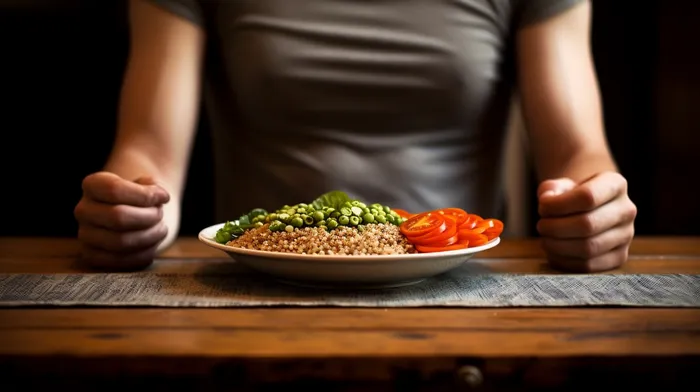When it comes to maintaining a healthy weight, eating habits and food choices play a huge role. But did you know that the speed at which you eat can also have a significant impact? It turns out that people with higher body weights tend to eat faster than their leaner counterparts.
The Science Behind Eating Speed
Researchers at the University of Rhode Island conducted a study investigating people’s eating speed and whether certain foods tend to be consumed more slowly than others. One of the key findings of the study was that individuals with higher body weights typically ate faster compared to those with lower body weights.
The speed at which one eats can have a massive impact on calorie consumption. When you eat more slowly, your body has the time to process fullness signals before you’ve consumed too much. As the lead author of the study, Kathleen Melanson, Ph.D., R.D., points out, “It takes time for your body to process fullness signals… slower eating may allow time for fullness to register in the brain before you’ve eaten too much.”
The Role of Grains
The study also found that foods made with refined grains were usually eaten more quickly than those containing whole grains. This is likely due to the fact that whole wheat and brown rice have a higher fiber content than processed grains, which means they take longer to chew.
When you eat foods rich in fiber, you’re more likely to feel full and satisfied, which can help prevent overeating. Plus, since whole grains take longer to chew, they also encourage a slower eating pace, which, as previously mentioned, can aid in weight management.
Gender Disparity in Eating Speed
Another interesting finding in the study was that men were shown to consume their meals significantly faster than their female counterparts. While the reasons for this discrepancy aren’t entirely clear, it does suggest that adopting a slower eating pace might be even more crucial for men who are trying to manage their weight and maintain a healthy lifestyle.
Tips for Slowing Down Your Eating Pace
- Chew more: Make a conscious effort to chew your food thoroughly before swallowing. The more you chew, the slower your eating pace will become.
-
Put your utensils down: Between bites, place your fork or spoon down on the plate, or even try holding your utensils in your non-dominant hand. This can help you focus more on the act of eating and give you more time to enjoy each bite.
-
Mindfulness: Practice mindful eating by really savoring the flavors, textures, and smells of your food. This will not only help you slow down your eating pace but can also lead to a much more enjoyable and satisfying dining experience.
-
Eat with company: Sharing a meal with family or friends encourages conversation, which naturally slows down the eating pace.
-
Limit distractions: Turn off the TV, put down your phone, and create a peaceful environment for your meals. When you’re less distracted, you’re more likely to eat more mindfully and slowly.
-
Choose high-fiber foods: As mentioned earlier, whole grains and other high-fiber foods take more time to chew, which can encourage a slower eating pace. Incorporate more of these healthy options into your meals for improved digestion and appetite control.
-
Drink water: Sip water throughout your meal, as this can help you feel full more quickly and encourage a slower eating pace.
Conclusion
In summary, eating slower can have a surprisingly positive effect on your weight management and overall health. By simply making a conscious effort to slow down at the dinner table and savor your food, you’ll not only enjoy your meals more but also improve your digestion, prevent overeating, and potentially lose weight. So take a deep breath, relax, and take your time with your next meal. Your body will thank you for it.



